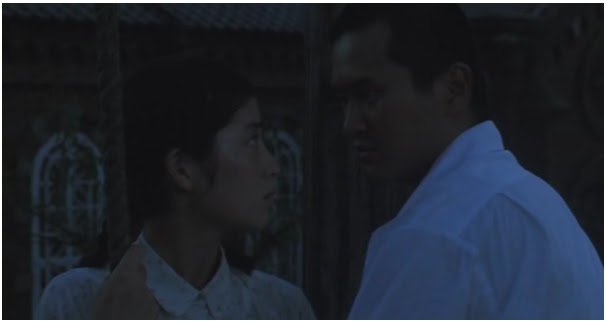Point of View
This movie is filmed in Japanese point of view. In this movie, women and children have roles just as important as men. The girl looked at the sky and bomb just explodes without any caution. This is the view from below. It shows Japanese lives right before A-bomb, it certainly is Japanese point of view. There are few scenes of Korean soliders and English soliders. Those Korean soldiers speak in Korean. Perhaps this is not really Japanese point of view, but I doubt if this was Korean point of view. I think this scene's point of view is anonymous, it just depicts the situation of that time.
Form of Social Criticism
I think this movie gives us a little sence of absurdism. Absurdism is the feeling people get when they can't find any meanings to life, people, and themselves. From the line in the beginning, "Should humans be erased like fog just the same as my mother and father?", audience gets the idea that something bad is going to happen to these characters but all they can do is just to keep on watching till the ends. In some sense, audience is waiting for their time to come. After bomb explodes, it makes each individual's life, all the joy and struggles, meaningless. This gave me a feeling of absurdism.
This movie also has nihilism. Just like "The man who stole the sun", all the struggles that characters went through and joy of life become nothing when nuclear explodes. There is nothing left. We don't know who survived and who died but the movie ends with explosion and it really makes it seem as if the world is over (at least their world is over).
The line "should human be erased like a fog the same as my mother and father?" gives us negative feeling, but I thought it may give us a little of hope as well. It says "my mother and father", thus it may be implying that the baby survived. I am not sure whether the director implied this or not, but I think it can be read in that way as well. (In addition, this line comes from a real person who survived from the bomb in Nagasaki, so there is a possibility of survival, and at least there are people who survived, there is a little hope.)
Reflection
After studying about this movie, I think the main message is that it can happen to anyone. I did not think that this movie is trying to make audience sympathize (althought, as a result, audience would). In this film, there is no any particular main character. Everyone in the film is important and they all have different things to deal with in life. It really dipicts our lives in the way that each individual are different and we encounter different events in life. In addition he also showed us Korean solider's life and English solider's life. They were in Nagasaki, thus they also died from Atomic Bomb. People who died from Atomic Bomb is not only Japanese and it could be anyone if s/he were in Nagasaki. No one has a reason to be killed by A-bomb. That's the message that I got from this film.

 The image of Urakami Tensyu Do (Urakami Cathedral), located 500m (1640ft.) northeast from center of the explosion. Urakami is the name of the place. It can also be translated as St. Mary's Cathedral, and it was known as the biggest cathedral in East of that time, until it was destroyed by A-Bomb. No one in the cathedral survived. Its wreckage and melted statue of Mary are one of the most famous thing to see in
The image of Urakami Tensyu Do (Urakami Cathedral), located 500m (1640ft.) northeast from center of the explosion. Urakami is the name of the place. It can also be translated as St. Mary's Cathedral, and it was known as the biggest cathedral in East of that time, until it was destroyed by A-Bomb. No one in the cathedral survived. Its wreckage and melted statue of Mary are one of the most famous thing to see in 






















